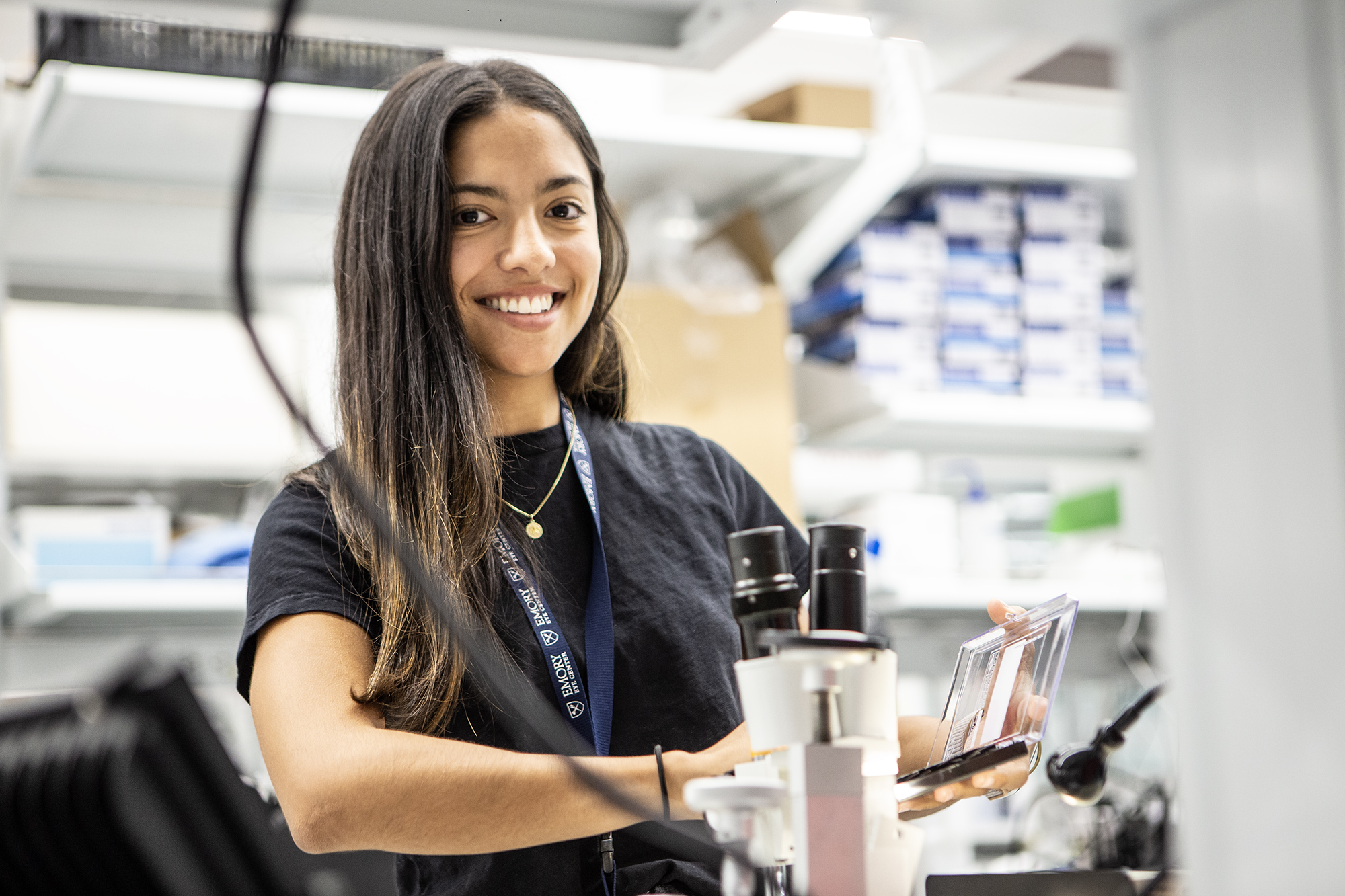For Ana Diaz, hard work is not an excuse. It's a motivator.
If there’s an engine churning inside Emory Eye Center’s intern Ana Diaz, it’s powered by soccer.
Recruited to play for the Georgia State University women’s soccer team, she served as captain for two years and averaged 4,200 playing minutes over the course of 50 career starts. She also played in the Olympic qualifying tournament for the Puerto Rican Women’s National Team.
The reason she dropped out of that Olympic bid says a lot about this future medical student: she didn’t want to miss her organic chemistry final.
“I told them when they recruited me at Georgia State that I wanted to do college right. So I’d take the soccer scholarship but I was going to take my studies very seriously. I knew I wanted to work in health care, and I was going to make sure my grades supported that goal. I’ve always played soccer with that purpose in mind. Healthcare was my passion. All my coaches knew that.”
One of those coaches knew something else about Diaz: she was unnecessarily restricting her career goals. After college, she was planning to become a physician's assistant (PA).
Her coach couldn't understand why she wasn't planning to become a doctor. And he told her so.
“He knew that as the captain of the team I was passionate, strategic, and always in control,” she said. “From what he had seen on the field, he knew that when I committed to something, I would do everything I needed to be the best.”
Suddenly, Diaz began mulling the idea of medical school. She knew it would mean a lot of catch-up, as most med school applicants had been plotting their careers since the day they started college. That didn’t bother her. She could take the pre-requisites and study for the MCATs. Still, she didn’t have any demonstrable experience in the field.
Then that same coach told Diaz that a friend of his – a pediatrician at Emory – might have a research opportunity for her if she didn’t mind working for free…
“I said I’ll do it, give me the number,” Diaz recalls.
Diaz dove into her volunteer work, not knowing yet if med school would be the next step. For the first time in her life, she entered a clinical setting as an employee – an assistant on a pediatric seizure study. For the last 18 months, she has conducted phone interviews to collect patient data and helped set up electrode monitors when participants come in for visits. All the while, she has been absorbing the verbal and non-verbal cues that tell physicians how to most effectively communicate with their patients. The process has entranced her.
“Honestly, sometimes I forget that they can see me - that I’m in the room - because I am so busy observing,” she said.
Diaz also participated in outreach clinics, where physicians provide free care to uninsured patients in the community. These tugged at her ambition.
“We need more of those,” she told the attending physician one day. “I could do those clinics. I would like to do those clinics.”
“You could do more of them if you were a doctor,” he said.
That sealed the deal.
Diaz knew that more experience would benefit her medical school application, so she jumped at the opportunity to become a summer intern at the Emory Eye Center. For eight weeks, she has split her time between the ophthalmology clinics and the ophthalmic research lab.
“I’ve gone into surgery twice, and it’s really cool,” she said. “The blood, the cutting, all of that doesn’t bother me. What I kept noticing was how smoothly the team works together. The anesthetist, the techs, the nurses, the surgeon –everyone works in harmony.”
Diaz’s research project – helping two post-docs optimize the protocol for their investigations – is the subject of her first-ever presentation before a medical school audience. On August 6, she took to the podium to deliver “Developing and Optimizing Protocols to Study the Effects of Intraocular Pressure Increase Associated with Glaucoma Using Ex-vivo and In-vivo Rat Models “ as a part of the Tuesday Morning Data Session series sponsored by the Atlanta Vision Research Community (AVRC).
Excited? Certainly. But not to the point of distraction. Ana Diaz has her eyes on a bigger picture. And she’s got an attitude that tells us she's in it to win it.
“I know it will be hard. Four years of med school, four years of residency, and then, a fellowship. But hard is just hard. You can deal with hard. You just work harder.”
Then, flashing her 1000-watt smile, she adds:
“It wouldn’t be fun becoming a doctor if getting there was easy. Hard means I worked for it. Doctors go through a lot training to gain a lot of knowledge. It would be really great to go through that training and have that knowledge. I’m ready to work for it.”


